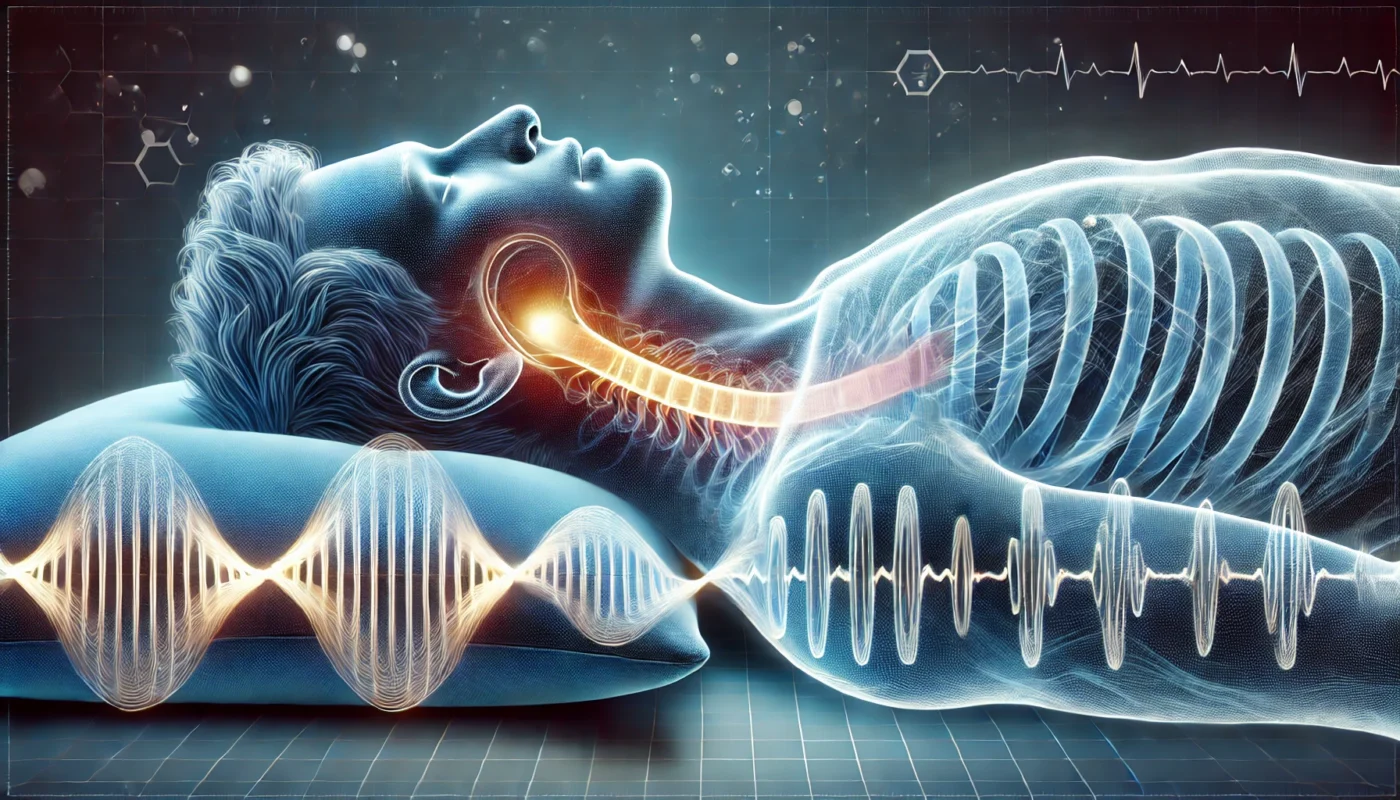Sleep apnea, a common yet underdiagnosed sleep disorder, affects millions of people worldwide. Characterized by repeated interruptions in breathing during sleep, sleep apnea can lead to fragmented sleep, chronic fatigue, cardiovascular complications, and diminished quality of life. Treatments often include lifestyle changes, continuous positive airway pressure (CPAP) therapy, or surgery.
Recently, interest has grown around the potential role of magnesium supplementation, particularly magnesium glycinate, in managing sleep apnea symptoms. This article explores the science behind magnesium’s impact on sleep, respiratory health, and whether magnesium glycinate could play a role in alleviating sleep apnea.
You May Also Like:
Magnesium Glycinate for Kids: Addressing Sleep and Focus Challenges
The Interaction Between Magnesium Glycinate and Sleep Hormones: Here’s the Science
Magnesium Glycinate and Sleep Apnea: Is There a Connection? is an original (HSLHealing) article.
Understanding Sleep Apnea
There are two main types of sleep apnea:
- Obstructive Sleep Apnea (OSA): The most common form, caused by the partial or complete blockage of the airway during sleep.
- Central Sleep Apnea (CSA): Less common, resulting from the brain’s failure to signal the muscles responsible for breathing.
Symptoms of sleep apnea include:
- Loud snoring.
- Gasping or choking during sleep.
- Daytime fatigue.
- Morning headaches.
The condition is associated with a range of risk factors, including obesity, age, and underlying medical conditions like hypertension and diabetes.

Magnesium’s Role in Sleep and Respiratory Health
Magnesium is an essential mineral involved in over 300 enzymatic processes in the body. Its influence on sleep and respiratory health makes it particularly relevant to sleep apnea. Key functions include:
- Regulating Muscle Function
Magnesium helps relax the smooth muscles, including those in the respiratory system. This relaxation may prevent airway obstruction, a hallmark of obstructive sleep apnea. - Supporting Nervous System Function
Magnesium modulates the activity of neurotransmitters, such as gamma-aminobutyric acid (GABA), which promote relaxation and stabilize sleep architecture. - Reducing Inflammation
Chronic low-grade inflammation contributes to the narrowing of airways in sleep apnea. Magnesium’s anti-inflammatory properties may help mitigate this effect. - Improving Sleep Quality
Magnesium promotes deeper, more restorative sleep by enhancing GABA activity and regulating melatonin production.
Research suggests that magnesium deficiency may exacerbate sleep apnea symptoms by increasing airway resistance and disrupting sleep cycles. A 2018 review in Nutrients highlights that magnesium deficiency is common in individuals with sleep disorders, including sleep apnea.
What is Magnesium Glycinate?
Magnesium glycinate is a chelated form of magnesium bound to glycine, an amino acid known for its calming properties. This formulation offers several benefits:
- High Bioavailability: Magnesium glycinate is well-absorbed and retained by the body, ensuring effective magnesium levels.
- Gentle on Digestion: Unlike magnesium oxide or citrate, magnesium glycinate is less likely to cause gastrointestinal discomfort, such as diarrhea.
- Dual Benefits: The glycine component enhances magnesium’s calming effects, promoting relaxation and better sleep.
These characteristics make magnesium glycinate a promising option for addressing the underlying factors that contribute to sleep apnea.
How Magnesium Glycinate May Help Sleep Apnea
1. Relaxing Airway Muscles
One of the key mechanisms in obstructive sleep apnea is the collapse of soft tissues in the throat, leading to airway obstruction. Magnesium glycinate may help by:
- Promoting Muscle Relaxation: Magnesium regulates calcium channels in muscle cells, preventing excessive contraction and supporting airway patency.
- Improving Respiratory Efficiency: Relaxed airway muscles reduce resistance, allowing for smoother airflow.
A study published in Respiratory Physiology & Neurobiology (2016) found that magnesium supplementation improved respiratory function and reduced airway resistance in patients with mild to moderate obstructive sleep apnea.
2. Enhancing Sleep Quality
Sleep fragmentation, a hallmark of sleep apnea, disrupts restorative sleep stages. Magnesium glycinate can improve sleep quality by:
- Increasing GABA Activity: Magnesium enhances the action of GABA, a neurotransmitter that calms the brain and promotes stable sleep.
- Regulating Melatonin Production: Magnesium supports the synthesis of melatonin, the hormone responsible for maintaining the sleep-wake cycle.
Clinical research in The Journal of Research in Medical Sciences (2012) found that magnesium supplementation improved sleep efficiency and reduced nighttime awakenings in individuals with sleep disorders.
3. Reducing Inflammation and Oxidative Stress
Chronic inflammation and oxidative stress are closely linked to the pathophysiology of sleep apnea. Magnesium glycinate combats these issues by:
- Inhibiting Pro-Inflammatory Cytokines: Magnesium lowers levels of cytokines like IL-6 and TNF-α, which contribute to airway inflammation.
- Boosting Antioxidant Defenses: Magnesium activates enzymes like superoxide dismutase (SOD) and glutathione peroxidase, reducing oxidative damage in respiratory tissues.
A 2020 study in Frontiers in Nutrition found that magnesium supplementation reduced markers of inflammation and oxidative stress in patients with chronic respiratory conditions, suggesting potential benefits for sleep apnea management.
4. Supporting Weight Management
Obesity is a major risk factor for sleep apnea, as excess fat around the neck and abdomen can restrict airflow. Magnesium glycinate may support weight management by:
- Improving insulin sensitivity, reducing the risk of weight gain and metabolic syndrome.
- Enhancing sleep quality, which is crucial for appetite regulation and metabolic health.
A study in Diabetes Care (2015) found that magnesium supplementation improved insulin sensitivity and reduced fasting glucose levels in overweight individuals, indirectly addressing a key risk factor for sleep apnea.

Clinical Evidence Supporting Magnesium for Sleep Disorders
1. Improved Sleep Parameters
A randomized controlled trial in Sleep Medicine Reviews (2020) demonstrated that magnesium supplementation improved sleep quality and reduced sleep onset latency in individuals with insomnia and sleep-disordered breathing.
2. Reduced Symptoms of Sleep Apnea
Research in Respiratory Physiology & Neurobiology (2016) found that magnesium reduced airway resistance and improved oxygen saturation in patients with obstructive sleep apnea, particularly when combined with lifestyle changes.
3. Enhanced Stress Resilience
A study in Stress and Health (2020) showed that magnesium glycinate supplementation reduced cortisol levels and improved overall stress resilience, factors that contribute to better sleep and respiratory stability.
How to Use Magnesium Glycinate for Sleep Apnea
1. Dosage Recommendations
The optimal dosage of magnesium glycinate depends on individual needs:
- General Guidelines: 200–400 mg of elemental magnesium per day.
- For Sleep Apnea: Doses closer to 300–400 mg may be most effective, as supported by clinical studies.
Check supplement labels to confirm the amount of elemental magnesium provided, as magnesium glycinate typically contains 10–14% elemental magnesium by weight.
2. Timing and Administration
- Evening Dosing: Magnesium glycinate is best taken 30–60 minutes before bedtime to promote relaxation and improve sleep quality.
- With Meals: Taking the supplement with food can enhance absorption and minimize potential gastrointestinal side effects.
3. Complementing CPAP Therapy
For individuals already using CPAP therapy, magnesium glycinate can be a supportive adjunct, enhancing sleep quality and reducing stress, which may improve adherence to treatment.

Potential Side Effects and Precautions
Magnesium glycinate is generally safe and well-tolerated, but excessive doses may cause mild side effects, such as:
- Diarrhea or loose stools.
- Nausea.
- Fatigue or drowsiness.
Consult a Healthcare Provider: Individuals with kidney disease or other conditions affecting magnesium metabolism should seek medical advice before starting supplementation.
Monitor Total Intake: Ensure magnesium intake from food and supplements does not exceed the tolerable upper intake level (UL) of 350 mg per day from supplements.
Conclusion
Magnesium glycinate offers a promising, natural approach to managing sleep apnea symptoms. By promoting airway muscle relaxation, improving sleep quality, reducing inflammation, and addressing underlying risk factors like stress and obesity, it targets several pathways involved in the condition.
While magnesium glycinate is not a standalone treatment for sleep apnea, it can be a valuable complement to established therapies like CPAP and lifestyle modifications. For individuals seeking to improve their sleep and overall health, magnesium glycinate provides a safe, effective, and scientifically supported option.

References
- Enhancement of Learning and Memory by Elevating Brain Magnesium. Retrieved from: https://www.sciencedirect.com/science/article/pii/S0896627309010447
- The Effects of Magnesium Supplementation on Subjective Anxiety and Stress-A Systematic Review. Retrieved from: https://pubmed.ncbi.nlm.nih.gov/28445426/
- Magnesium in the Central Nervous System. Retrieved from: https://www.ncbi.nlm.nih.gov/books/NBK507256/
- Magnesium and aging. Retrieved from: https://pubmed.ncbi.nlm.nih.gov/20388094/
- The Effects of Magnesium Supplementation on Subjective Anxiety and Stress-A Systematic Review. Retrieved from: https://pubmed.ncbi.nlm.nih.gov/28445426/
- The effect of magnesium supplementation on primary insomnia in elderly: A double-blind placebo-controlled clinical trial. Retrieved from: https://pubmed.ncbi.nlm.nih.gov/23853635/
Important Note: The information contained in this article is for general informational purposes only, and should not be construed as health or medical advice, nor is it intended to diagnose, prevent, treat, or cure any disease or health condition. Before embarking on any diet, fitness regimen, or program of nutritional supplementation, it is advisable to consult your healthcare professional in order to determine its safety and probable efficacy in terms of your individual state of health.
Regarding Nutritional Supplements Or Other Non-Prescription Health Products: If any nutritional supplements or other non-prescription health products are mentioned in the foregoing article, any claims or statements made about them have not been evaluated by the U.S. Food and Drug Administration, and such nutritional supplements or other health products are not intended to diagnose, treat, cure, or prevent any disease.

